Best Online Accounting courses in 2025
Explore the best online accounting courses in 2025, from affordable skill-building options to accredited degree programs, to advance your career.
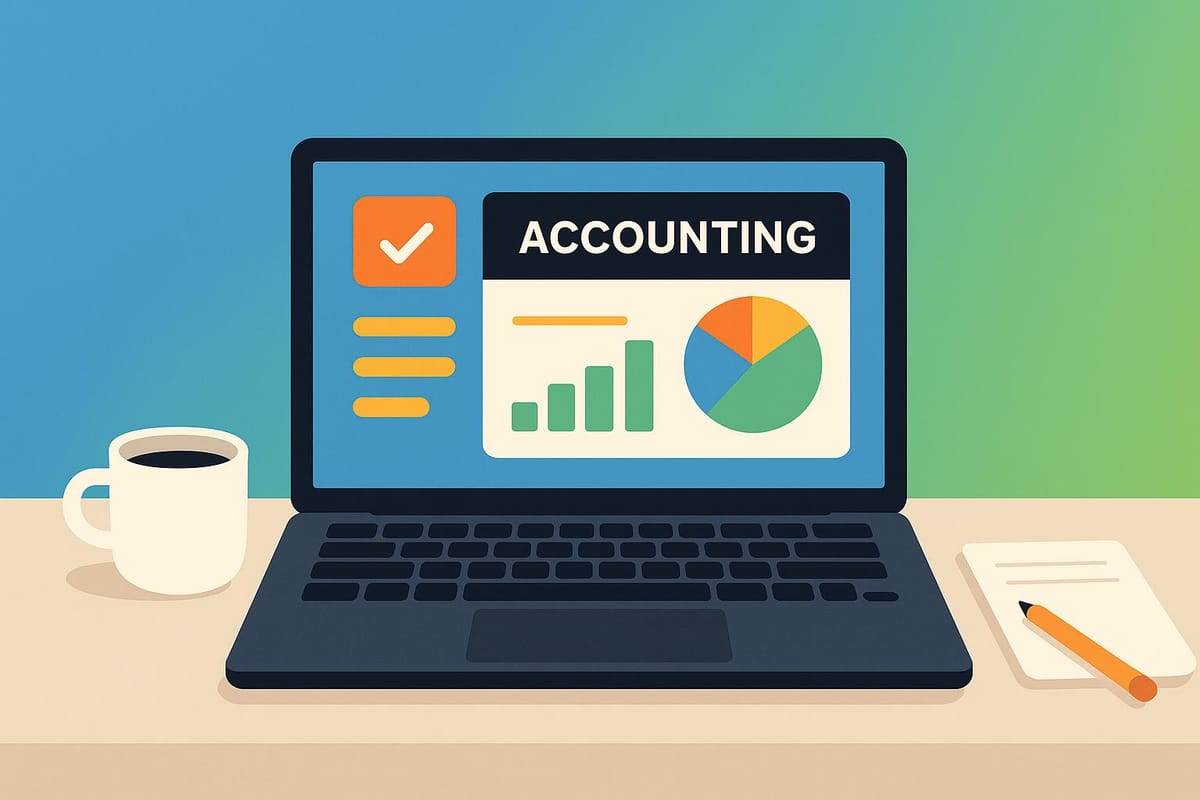
The demand for skilled accountants is growing, and online accounting courses are helping bridge the skills gap. Whether you're starting a career, switching fields, or advancing your expertise, there are plenty of options to choose from in 2025. Here's a quick rundown of the top programs:
- Upskillist: Affordable at $39.99/month with a focus on practical skills like Excel and bookkeeping. CPD-accredited and includes lifetime access.
- Southern Utah University: AACSB-accredited, offering a comprehensive curriculum for $7,200 annually. Nearly 100% job placement rate for graduates.
- Maryville University: ACBSP-accredited with flexible scheduling and specialized electives. Costs $575 per credit and supports CPA prep.
- Udemy: Offers 747 self-paced courses from $9.99 to $199.99. Great for targeted skills but lacks formal accreditation.
Key Takeaway: Choose a course based on your career goals, budget, and learning style. Upskillist and Udemy are ideal for skill-building, while Southern Utah and Maryville cater to those seeking formal credentials.
Top Free Online Accounting Courses for Career Growth
1. Upskillist Online Accounting Course
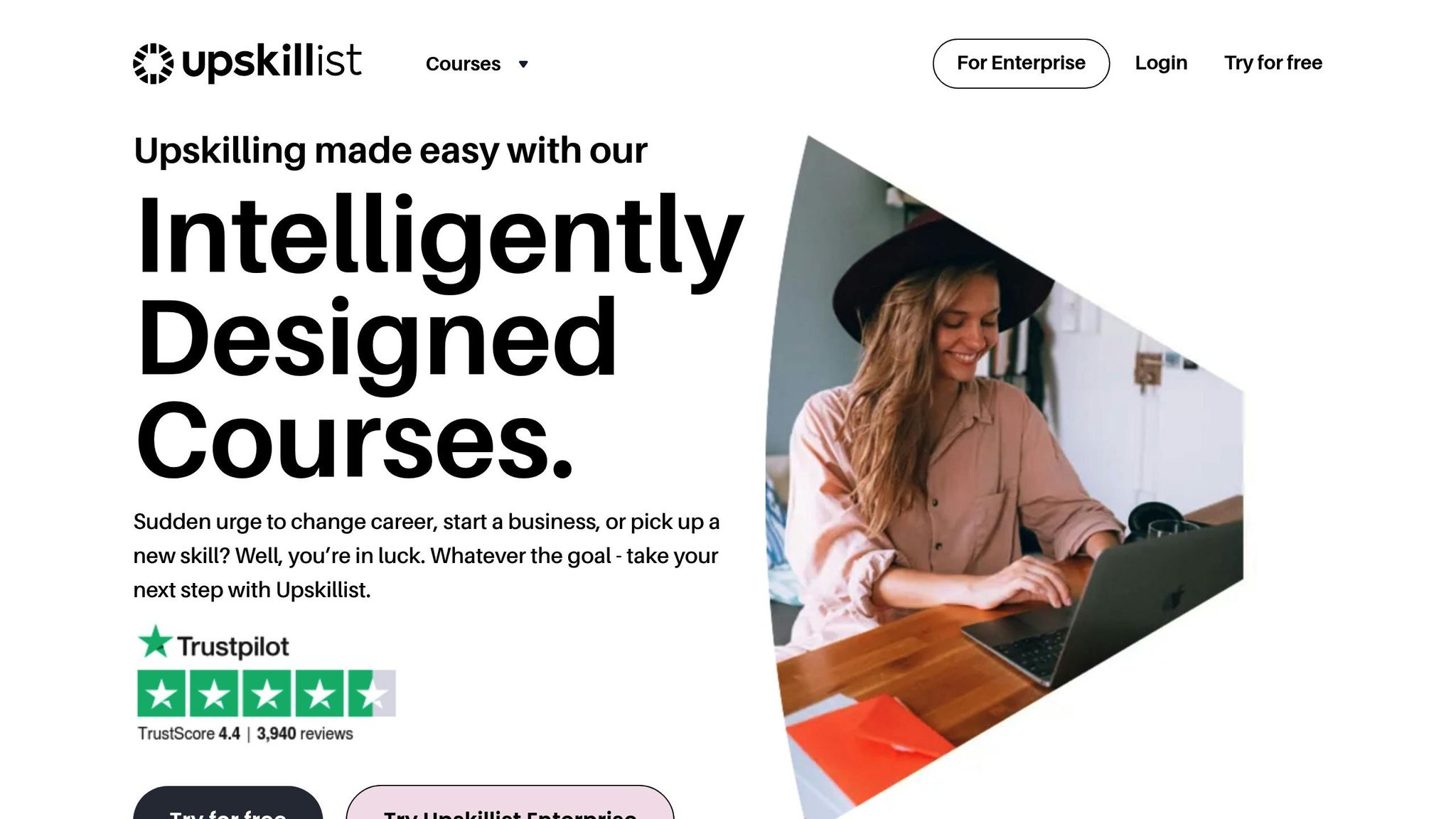
The Diploma in Personal Bookkeeping and Accounting from Upskillist is designed to teach the essentials of bookkeeping and accounting, making it ideal for managing personal and small business finances. With over 612,000 graduates and a solid 4.4/5 rating from 3,937 reviews, it’s a popular choice for beginners in accounting or small business owners looking to sharpen their financial skills.
This course focuses on practical, hands-on learning, offering training in Excel and other professional tools to ensure students gain skills they can apply right away.
Course Structure
The course spans 32 lessons divided into four modules, completed over 16 weeks.
- Module 1 (Professional): Lays the groundwork with topics like the history of accounting, differences between bookkeeping and accounting, T-accounts, the accounting equation, managing cash books and ledgers, and preparing trial balances.
- Module 2 (Intermediate): Dives into practical tasks such as bank reconciliations, managing trade receivables, inventory tracking, fixed asset accounting, payroll, and reconciling debtors and creditors.
- Module 3 (Advanced): Focuses on more complex areas like identifying and correcting errors, year-end procedures, internal controls, audit preparation, budgeting, and forecasting.
- Module 4 (Proficient): Teaches students how to create and analyze annual financial statements, including balance sheets, income statements, cash flow statements, and more. It also covers accounting ratios and consolidation principles.
Accreditation
This course is accredited by the CPD (Continuing Professional Development) Certification Service, giving the certification extra weight in the professional world.
Flexible Learning Options
Upskillist offers flexibility to fit busy schedules. The "WATCH NOW" feature allows learners to access lessons anytime, while the "TIMETABLE" option provides structured sessions 2–3 times a week. Each lesson lasts between 30 and 50 minutes, and recordings are available for unlimited viewing on any internet-connected device.
Cost and Accessibility
At $39.99 per month, the course offers an affordable way to develop professional accounting skills. A 7-day free trial is available for those who want to explore the platform before subscribing. Once enrolled, students get lifetime access to all course materials.
With its emphasis on Excel training and real-world scenarios, this course is particularly useful for those looking to apply their knowledge immediately, whether in their current role or as they transition into the accounting and finance field.
2. Southern Utah University Online Accounting Program
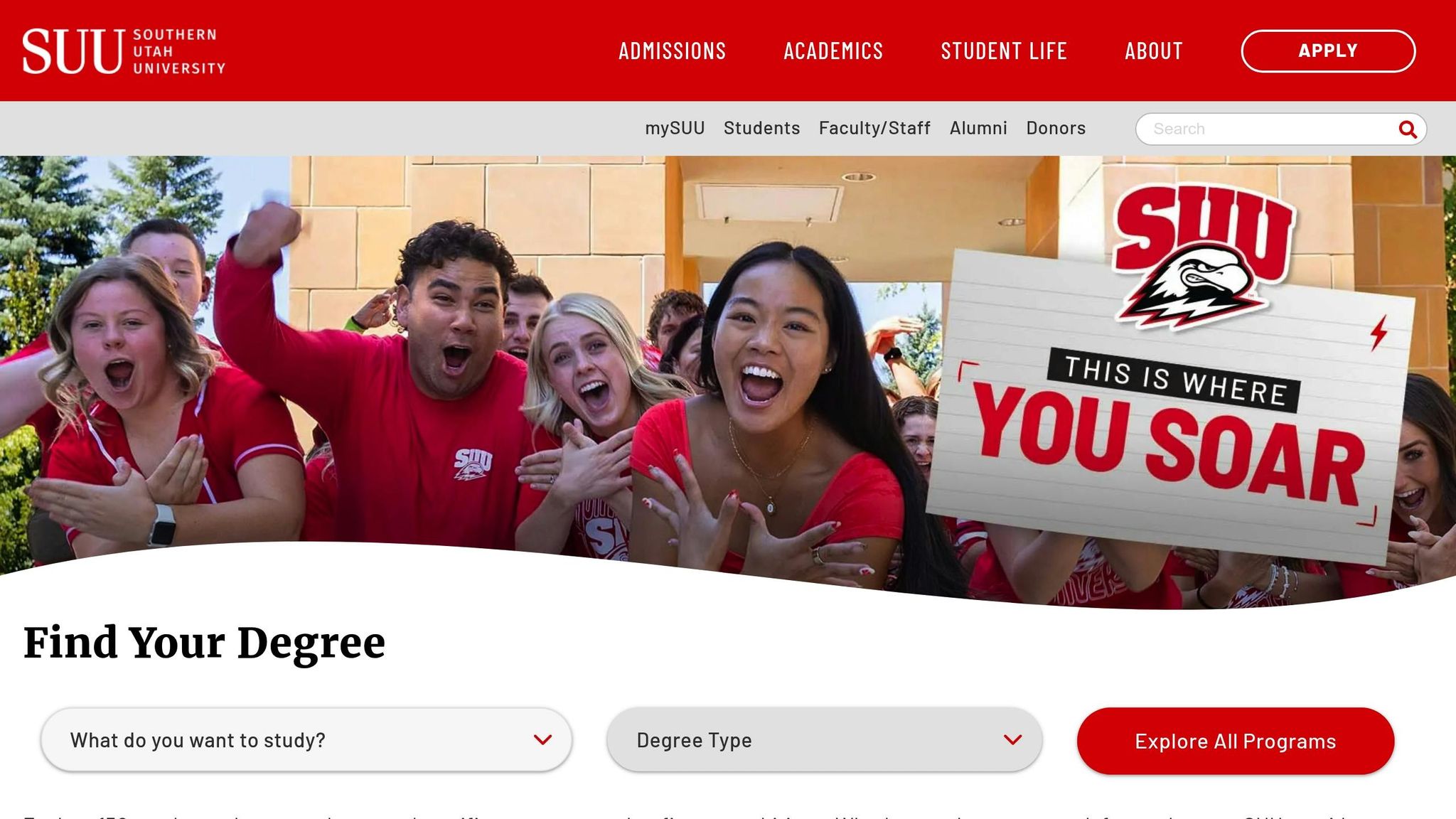
Southern Utah University's online accounting program offers a flexible and accredited path for working professionals aiming to advance their careers. This program blends academic rigor with convenience, making it a great choice for students balancing work, family, and education. Here's a closer look at what sets this program apart.
Accreditation
The program is accredited by AACSB, a mark of excellence that reflects its high standards. Graduates boast a CPA exam pass rate that exceeds the national average and enjoy nearly 100% employment rates after graduation. In 2024, the Dixie L. Leavitt School of Business highlighted how employers actively recruit students even before they complete their degree. This strong reputation stems from a curriculum designed to prepare students for real-world success.
Curriculum Highlights
Students in the program gain a comprehensive understanding of key areas essential for today’s accounting professionals. The curriculum spans accounting, economics, finance, information systems, management, and marketing, giving students a solid foundation in business. Beyond technical expertise, the program emphasizes critical skills like communication, analytical thinking, and ethical decision-making.
Key topics include:
- Managerial accounting
- Taxation
- Auditing
- Financial accounting
- Accounting information systems
- Accounting analytics
Students also develop proficiency in essential tools and technologies, such as accounting software, data analytics, data visualization, and advanced Excel. The program requires a total of 74.5 credits, divided into four parts: Pre-Business Foundation (23 credits), Additional Business Foundation (9 credits), Business Core (18.5 credits), and Accounting Core (24 credits). Courses in the Accounting Core include Financial Accounting I & II, Tax I, Cost Accounting, Accounting Data Analytics, Advanced Accounting, and Auditing I.
Flexible Learning Experience
Southern Utah University’s program is delivered 100% online through an asynchronous format. This setup is perfect for busy professionals who need flexibility. Students can access course materials anytime, from any device. The program includes discussion boards, video lectures, and structured deadlines, allowing students to progress at their own pace. Whether you prefer studying early in the morning, during a lunch break, or late at night, this format adapts to your schedule. With no live sessions, students have full control over their learning experience.
Affordability and Career Prospects
While specific tuition details aren’t provided, SUU positions itself as offering top-tier education at an accessible cost. The investment pays off: graduates earn a median annual salary of $63,550, with accounting jobs projected to grow by 13%. The program’s strong job placement rate - nearly 100% - means students can quickly see a return on their educational investment.
3. Maryville University of Saint Louis Online Accounting Degree
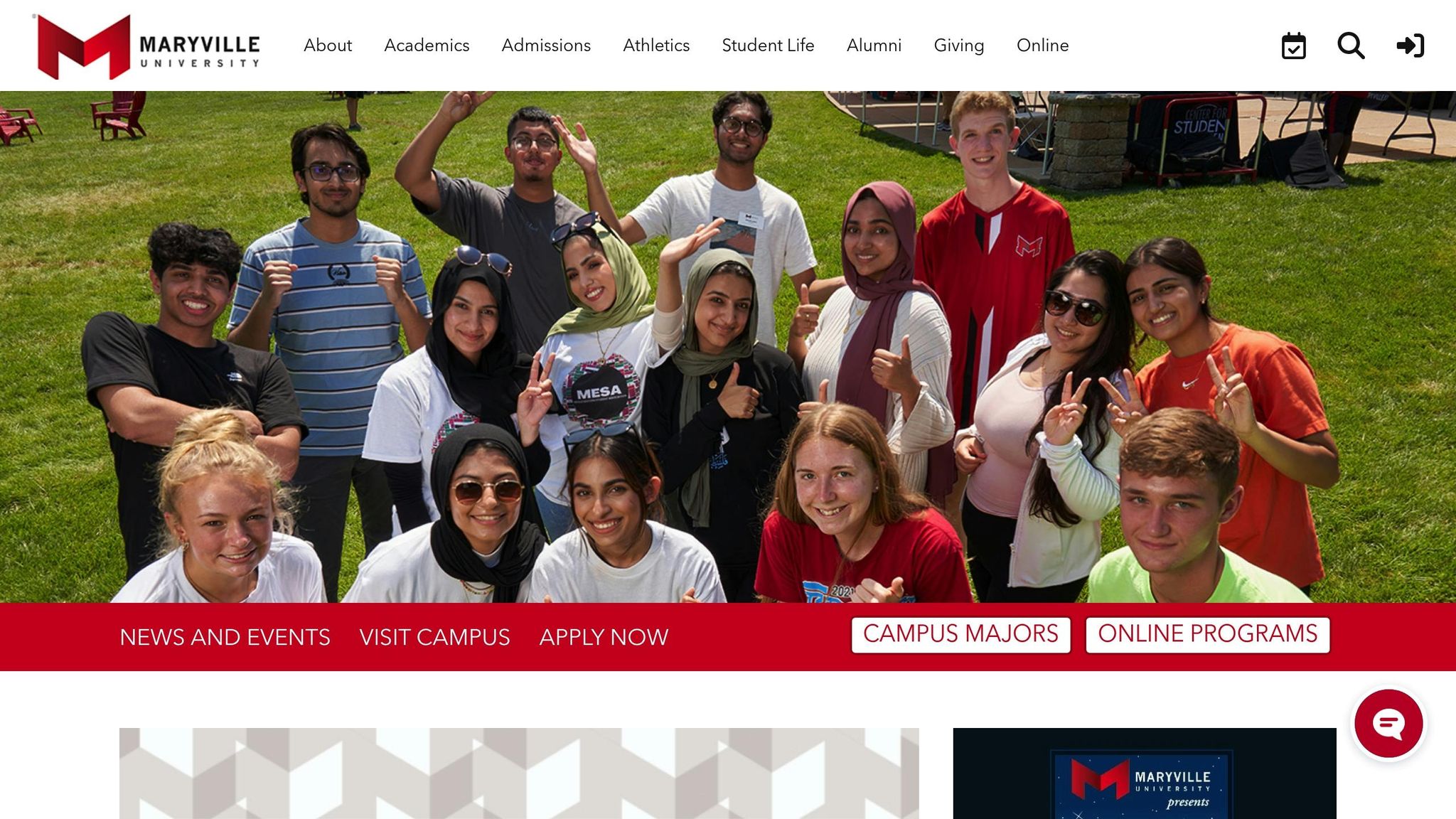
Maryville University stands out for its well-rounded curriculum and flexible online format, designed specifically for professionals looking to advance their careers. The online Bachelor of Science in Accounting program combines academic depth with practical skills, offering graduates opportunities to enter the workforce immediately or pursue CPA certification. With 83% of Maryville students enrolled in online programs, the university has built a strong reputation for delivering quality education remotely.
Accreditation
Maryville University is accredited by the Higher Learning Commission (HLC). Additionally, its John E. Simon School of Business holds specialized ACBSP accreditation for its accounting degrees, ensuring high academic standards and industry relevance.
Content Coverage
This 128-credit program is structured across five key areas: general education, electives, business core, accounting major, and accounting electives. Students gain a solid foundation in business topics like Digital Foundations, Financial and Managerial Accounting, Economics, and Business Law. Advanced courses include Forensic Accounting, Taxation, Auditing, and Advanced Managerial Accounting.
Electives allow students to dive deeper into areas like Tax Planning, Governmental Accounting, Data Analytics, and Accounting Information Systems. The program also incorporates hands-on training with QuickBooks, a tool used by 80% of small businesses. This comprehensive approach ensures students are well-prepared for both immediate employment and long-term career growth.
Flexibility
Maryville's program is offered entirely online, making it accessible to working professionals. With three start dates each year, students can begin their studies at a time that suits their schedule. The program also supports part-time enrollment and accepts transfer credits, simplifying the path for those with prior coursework. The application process is straightforward, with no fees or SAT requirements.
Pricing
While specific tuition costs are not listed, the program emphasizes affordability and flexibility. Payment plans and scheduling options are available to accommodate diverse financial needs. Additionally, Maryville offers an Early Access program, allowing undergraduates to earn up to 12 credits toward a master’s degree, providing a cost-effective way to further education.
4. Udemy Accounting Courses
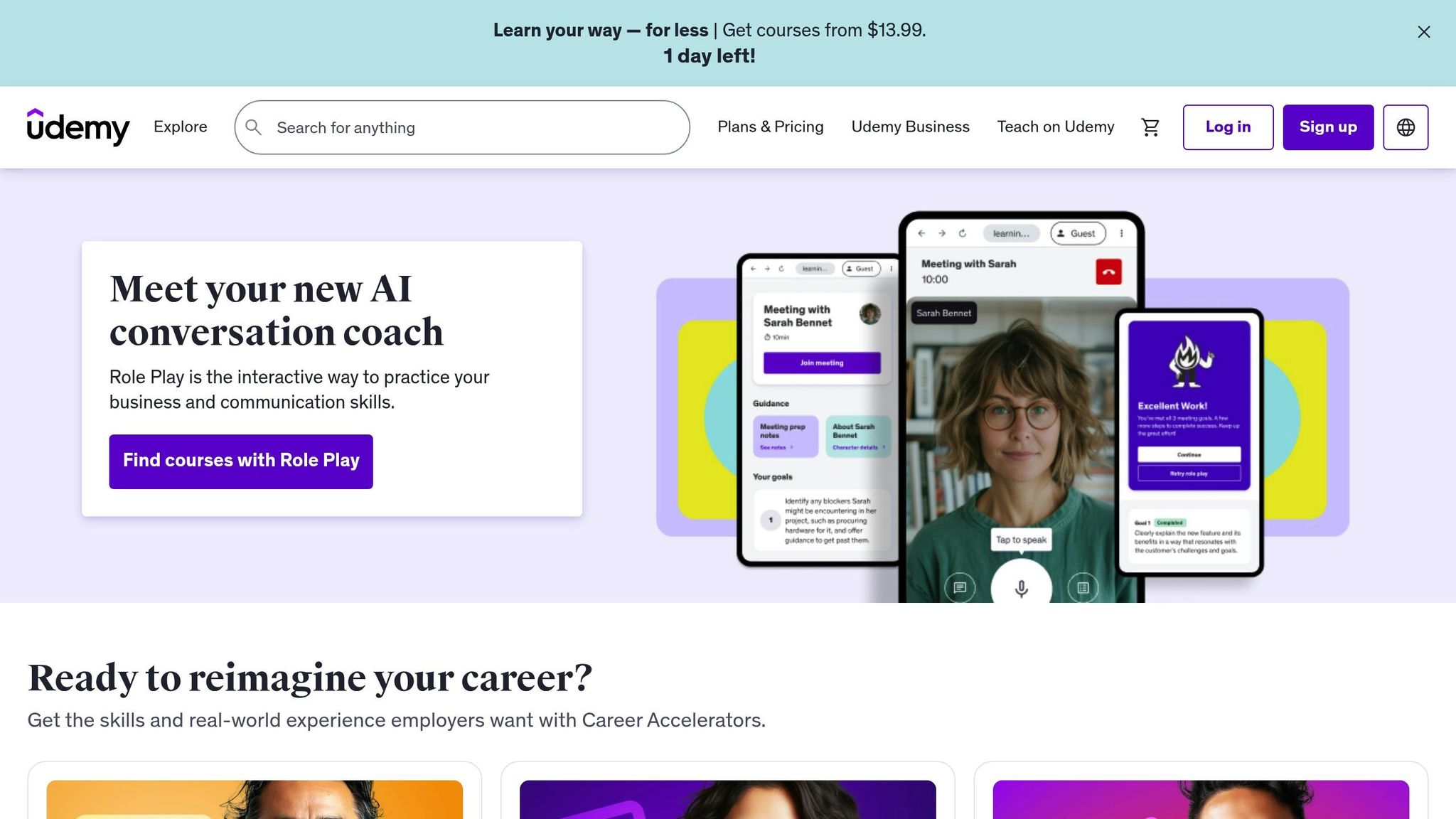
Udemy offers a flexible alternative to traditional, structured programs by providing self-paced, modular courses. With 747 accounting courses available, the platform has attracted 2.6 million learners and boasts an impressive average rating of 4.4 out of 5. From basic bookkeeping to advanced financial modeling, Udemy's courses are designed to help learners build targeted skills.
Content Coverage
Udemy's accounting courses cover a wide range of topics, from foundational concepts to advanced techniques. Core subjects include financial accounting, which focuses on collecting financial data and preparing reports for external stakeholders, and management accounting, which supports internal decision-making. Tax accounting courses provide insights into current tax laws and compliance requirements.
The curriculum spans essential topics like double-entry bookkeeping, financial statement preparation, and managing accounts payable/receivable. Advanced courses dive into areas such as forensic accounting, financial modeling, and specialized fields like partnership and nonprofit accounting. Learners can also explore emerging tools, including QuickBooks Online with Intuit Assist, Sage Intacct, Vic.ai, and MindBridge AI. Popular courses, such as "Complete Accounting & Bookkeeping: Master Accountancy 2025", cover the complete accounting process alongside specialized topics like financial statement and ratio analysis. To enhance practical skills, Udemy offers 1,716 hands-on exercises.
Flexibility
One of Udemy's standout features is its flexibility. Learners gain lifetime access to course materials, allowing them to revisit content whenever needed. The self-paced format is ideal for those juggling education with work or family commitments. The platform's mobile apps for iOS and Android make studying even more accessible, and with courses offered in over 75 languages, students can tailor their learning experience. Features like pausing, rewinding, and replaying lessons ensure complex topics are thoroughly understood. Plus, a 30-day refund policy provides a risk-free way to explore courses.
Pricing
Udemy's pricing is another major draw. Courses are priced between $9.99 and $199.99, with frequent discounts and a 30-day money-back guarantee. For instance, "Introduction to Finance, Accounting, Modeling and Valuation" is available for $27.99 (down from $159.99), and "Complete Accounting & Bookkeeping: Master Accountancy 2025" is offered at $16.99 (originally $74.99).
For broader access, the Personal Plan subscription costs $20.00 per month and includes a 7-day free trial. Organizations can opt for Udemy for Business, which offers team plans starting at $360 per user annually, with customizable enterprise pricing for larger groups.
Course Comparison: Pros and Cons
Choosing the right course depends on your goals, budget, and preferred learning style. Here's a breakdown of some popular online accounting programs to help you decide:
| Feature | Upskillist Online Accounting Course | Southern Utah University Online Accounting Program | Maryville University of Saint Louis Online Accounting Degree | Udemy Accounting Courses |
|---|---|---|---|---|
| Accreditation | Accredited courses with globally recognized certifications | AACSB accredited | Accredited by ACBSP | Not applicable (individual courses) |
| Content Coverage | 100+ subjects with industry expert-designed content | Financial and cost accounting, taxation, auditing, data analytics, and accounting information systems | Electives including data analytics, tax planning, and QuickBooks for accounting professionals | 747 courses covering basic to advanced topics |
| Flexibility | 100% online with flexible scheduling and lifetime access | 100% online asynchronous delivery | Learn on your schedule | Self-paced with lifetime access |
| Pricing | 7-day free trial, then subscription-based | $7,200 annual tuition | $575 per credit | $22.99-$27.99 per course (on sale) |
| AI Features | Compass AI and Pathfinder for personalized learning | Not available | Not available | Not available |
| Career Support | Enterprise solutions and personalized learning paths | University career services | University career services | Limited career support |
The table highlights key features, but let's dive deeper into the unique strengths and potential drawbacks of each option.
Upskillist stands out with its AI-driven tools, like Compass AI and Pathfinder, which tailor the learning experience to your progress and goals. With over 100 subjects and lifetime access, the subscription model provides flexibility and value, especially with the 7-day free trial. This platform is ideal for those looking to build practical skills quickly.
Southern Utah University offers the credibility of AACSB accreditation, which is highly regarded by employers. Its curriculum focuses on relevant areas like data analytics and accounting information systems, aligning with industry trends. However, the $7,200 annual tuition could be a hurdle for budget-conscious learners, and the structured approach may not suit everyone.
Maryville University caters to those seeking specialized knowledge, offering electives in areas like tax planning and data analytics. The per-credit cost of $575 allows students to manage expenses by taking only the credits they need. Additionally, the Early Access program lets students apply credits toward both bachelor's and master's degrees, which is especially useful for CPA candidates needing 150 education credits.
Udemy shines in affordability and variety, with 747 accounting courses catering to a wide range of skill levels. The platform has attracted 2.6 million learners and maintains an average rating of 4.4 out of 5 stars. Its self-paced structure is perfect for busy individuals, and frequent sales make it easy to find courses under $30. However, Udemy's certificates focus on skill-building rather than formal accreditation.
For those aiming to enhance specific skills or gain practical knowledge quickly, Upskillist and Udemy provide flexible, hands-on learning options. Upskillist's personalized AI tools ensure targeted skill development, while Udemy offers a vast selection of courses at an affordable price. On the other hand, Southern Utah University and Maryville University are better suited for individuals seeking formal credentials and academic rigor. With programs like these, graduates often see strong career outcomes - for instance, the University of Minnesota Crookston reports that 90.4% of its accounting graduates secure employment within a year. These options are ideal for those pursuing traditional career paths in accounting.
Conclusion
When selecting your 2025 online accounting course, let your goals and learning preferences guide your decision. With 2,678,347 learners already engaged in accounting courses and accounting jobs expected to grow by 10.6% by 2032, it's clear that the demand for quality, flexible education is only increasing.
For those just starting out in accounting, focus on courses that cover the fundamentals: basic accounting principles, financial statements, bookkeeping, budgeting, and tax basics. Make sure the program includes training in accounting software - an essential skill in today’s tech-driven workplace. Many highly rated beginner-friendly courses are available across various platforms.
If certification is part of your career plan, choose courses that align with those requirements. Dr. Tracie Miller, Chair of Franklin University's Accounting Programs, emphasizes:
A CPA is the gold standard for accountants, and many jobs will require CPA certification.
Certified accountants typically earn 5–15% more, with median salaries hovering around $74,600. Programs like Upskillist’s AI-driven learning provide practical and personalized pathways to help you meet these goals.
Costs for online accounting programs vary widely. Degree programs range from $7,500 to $30,000 annually, while certificate programs typically cost $300–$500 per credit. Upskillist’s subscription model, which includes a 7-day free trial, offers a budget-friendly alternative.
Accreditation is another key factor to consider - it ensures program quality. Check a school’s accreditation status on its website or through CHEA. The flexibility of online courses is particularly advantageous for busy professionals. With 40% of students pursuing online degrees to boost job prospects and 87% finding their education worth the investment, the value of these programs is undeniable.
Whether you opt for Upskillist’s AI-powered personalized learning, a university program for formal credentials, or targeted individual courses, make sure your choice aligns with your career goals and personal learning style. Explore free trials and course previews to find the best fit. With the accounting field continuing to grow and online education proving its value, choosing the right course today can set you up for success in the evolving financial world.
FAQs
What should I look for in an online accounting course in 2025?
When you're picking an online accounting course for 2025, there are a few important things to keep in mind. Start by checking for accreditation - this ensures the program meets industry standards. Then, look at the course content to confirm it covers key areas like financial reporting, tax preparation, and auditing. If the course includes certifications or CPA exam prep, that's a big plus for advancing your career.
You’ll also want to think about cost, duration, and how well the course fits into your schedule - especially if you’re juggling work or other responsibilities. Take some time to read reviews from past students to get a sense of their experience, and see if the program matches your career goals. Picking the right course means you’ll not only build essential skills but also stay aligned with your professional ambitions.
How do the accounting programs at Southern Utah University and Maryville University prepare students for successful careers?
Accounting Programs at Southern Utah University and Maryville University
Southern Utah University’s accounting program, accredited by the AACSB, delivers an education that meets rigorous industry standards. This prestigious accreditation is widely respected by employers, giving graduates a noticeable advantage when entering the workforce.
Maryville University takes a career-focused approach with its accounting programs, offering a well-rounded curriculum aimed at preparing students for roles like accountants and auditors. Graduates can look forward to strong earning potential and a wealth of opportunities in a growing job market.
Both institutions are committed to equipping students with the skills and knowledge needed to succeed in accounting, laying a strong foundation for career growth and employability.
What are the benefits of taking a self-paced accounting course like the ones offered by Upskillist?
Self-paced accounting courses offer the freedom to learn at your own pace, making it easier to juggle studies alongside a hectic schedule. Whether you're managing a full-time job, family responsibilities, or other personal commitments, these courses can seamlessly fit into your life.
They also give you the chance to tailor your learning journey. You can breeze through topics you already know or spend extra time on areas that need more attention. This approach helps ease pressure and allows you to truly grasp the material. It's a great option for professionals, students, or anyone looking to switch careers and build new skills on their own terms.

